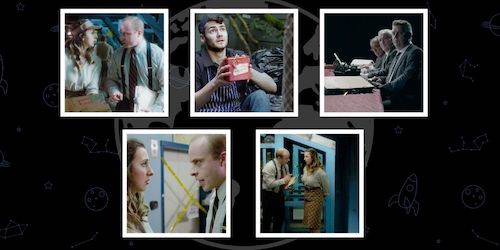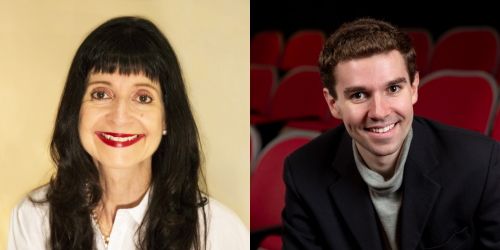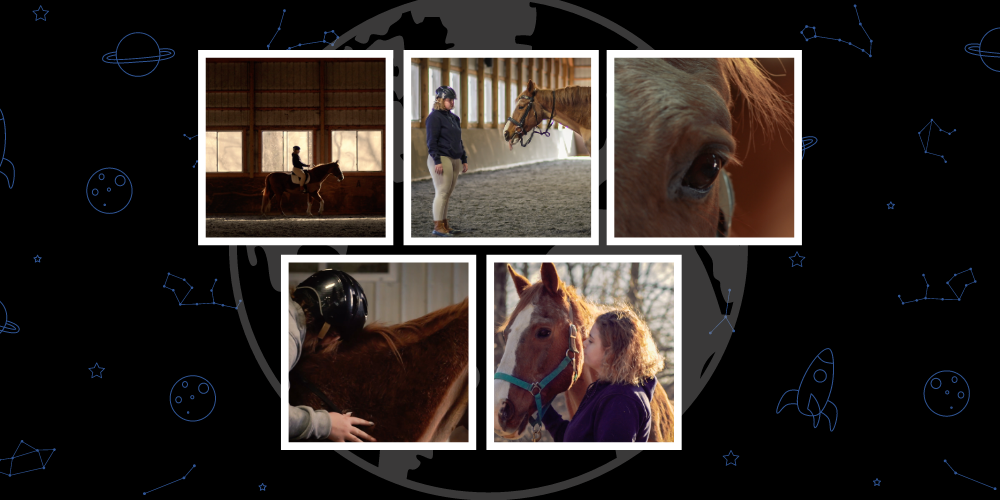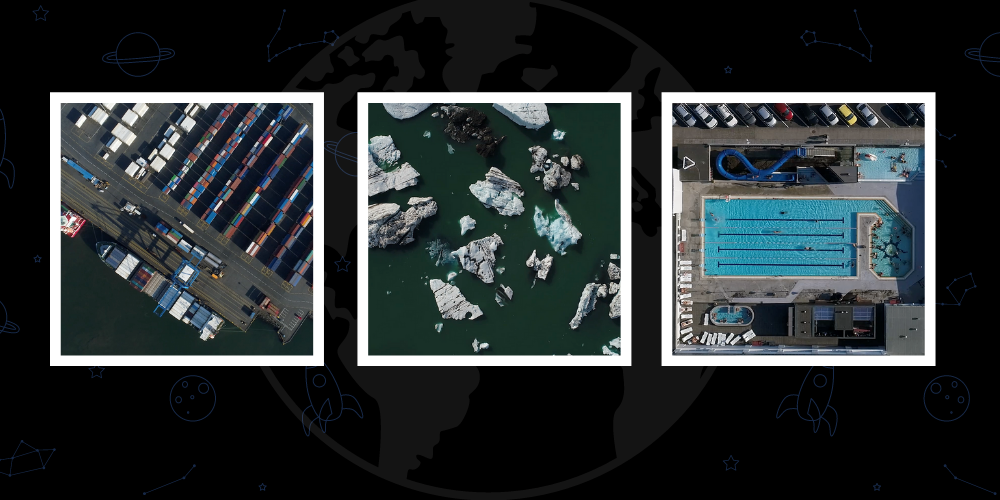This month audiences can screen Malibu Taetz’s Vissza a feladónak (NFFTY kurátora) a Planet Classroom Network YouTube csatornáján. Egy fiatal nő az első napját egy hatalmas mennyei postahivatalban kezdi, és egy kis piros csomagot kap, amelyen „az élet értelme” van felírva., amit akaratlanul is a tervezett időpont előtt a földre küld. The box ends up in the hands of a young man on Earth, a dishwasher taking out the trash. Moira must choose between helping the person who received the package and helping the universe restore order. What follows is a hilarious, mystical, and cathartic story that is great fun for viewers of all ages.
A Global Search for Education is pleased to welcome Director Malibu Taetz.
Malibu, your film was really well done! The sets, camerawork, and acting were all very refined. Legfőképpen, the subject matter was truly unique. What made you want to have a film revolving around the meaning of life, of all things?
Thank you so much! I’m really glad you enjoyed watching it. We had a really good team to put together Return To Sender. Így, I’m just really proud of what everyone did and how it came together. In terms of the meaning of life in the film, I guess I wanted to make something that would deal with these larger metaphysical concepts and to have a film with a deeper meaning to it and at the same time not to be depressing. Cause I don’t…well maybe I’ll talk a little bit more about what the film means to me a bit later on, but I remember trying to come up with an idea for a story and wondering, “Okay, where do ideas come from?", and could they actually belong to anybody like good people have possession of an idea or what if there was some mailroom up in the cosmos where all the great ideas were stored and they were scheduled to be sent down to different people. That was just trying to wonder where an idea could come from and that’s kind of where Vissza a feladónak got started.
The vision of your film was very clear, and I felt engrossed in the story as soon as the premise was revealed. What were/are your main influences when it comes to filmmaking, and how do you see them inspiring your work?
So for Return To Sender, Josh and I brought in all kinds of things that we love from all different areas of the spectrum. Joshua Vanderlinden is the co-writer and the producer of the film, and we discovered that we really had this love for world building. So then the world we created for Return to Sender was so huge that we had to be very selective in particular about what we showed on screen and we just hinted at. So I was really inspired by the quirky and very unusual style of filmmaking from these two filmmakers in the 1930s, Frank Capra and Preston Sturges, and we were also both inspired by things like Terry Gilliam’s Time Bandits and the Coen Brothers’ The Hudsucker Proxy. But on the other end of the spectrum, we were heavily inspired by Greek mythology and things like Prometheus stealing fire from the gods and bringing it down to Earth or like Pandora’s Box, and also some really unique and imaginative short stories by JRR Tolkien. So we wanted to create something that could blend these grand mythological ideas with this quirky old school style of filmmaking and that was really fun to explore. And afterwards things like The Good Place came out, which I was so excited about because they did exactly that and handled it so well.
As I noted before, your decision to make your story revolve around the meaning of life is fascinating. Was the decision to make the “meaning of life” in the film a lemon speak to your true feelings about the meaning of life? Ha nem, do you believe that trying to find the meaning of life is an important task, as your film suggests?
Így, the lemon was actually an accident. Originally we had sheet music in the box and then we had nothing in the box and then there was this one night that Josh and I were typing, or he was typing and I was just talking, and somehow some words got garbled and there ended up being a lemon in the box suddenly and it was about 2 a.m. so we found this so funny that the idea that they put a placeholder in the box and when you open it there’s just this lemon inside. And then the next morning, it was still funny so we kept that! But I think to me at the heart of Return To Sender is this picture of one person helping another person. So I got this sort of idea that you could take all of the great philosophers and thinkers and scientists in the world and put them together in this room and have them talk for a thousand years and they still wouldn’t really be able to answer the question of “What is the meaning of life?", or you could tell us one person helping another person and although this may not exactly answer what the meaning of life is I think it’ll get you a lot closer to it. And that’s kind of the crux of Return To Sender. You have this contrast of the organizing personnel, the top who are meant to be scheduling and discussing and giving meaning to everything in the universe, and then just this little store kind of slips under their radar of Moira the clerk helping Bradley the dishwasher who mistakenly gets sent this lemon.
What were the biggest challenges while making Vissza a feladónak? Were there any aspects of the writing or production that stick out in that regard?
The biggest challenge for us is probably similar to what it is for many Indie filmmakers which is just money. So for Vissza a feladónak we had to create this huge almost infinite world. We knew from the start that we wanted to rely on old school techniques like matte paintings and small models, but from there the name of the game is what you show and what you let the viewer’s imagination fill in. So we put a lot of thought into that. There’s so many stories of how we just seemingly accidentally ended up with the locations, like a retired 1950s Canada Post building and the smoke-filled department of forgetfulness. Végül, our production designer, Anna Listopad, did a fantastic job in making grand things out of what we gave her, and our cinematographer, Martin Dudzik, did this fantastic job of shooting and framing it, and I learned a lot about filmmaking from him. I think everybody came together in a really special way to make this story work, so we could overcome the challenge that is always present, at least so far in my however long… not very long career yet, of money is that challenge. But when you have passionate people that’s…and creative people who can come up with solutions that’s how you get around that.
Do you have any tips or knowledge to pass onto young, aspiring filmmakers? What are some resources you would recommend to anyone trying to get into the field?
I would say several things. One is to find the people who really love to do the same things that you love to do. Like collaboration among passionate people in common creative goal is one of those wonderful things in the world and everybody really cares. You can do an awful lot with a shoestring budget. Another thing I’d say is don’t be afraid to knock on doors with big important people behind them because you never know what might open. Like to get the mailroom scenes, I just walked into the huge postal building, told the person at the desk what we wanted to do, and asked who I could talk to about it. I was pretty sure we’d get a no but there was nothing to lose and we got so many no’s during Vissza a feladónak but we made the film with the yeses that we got. And the postal building turned out to be a yes, and it was one of the best yeses we got in the movie. Végül, I’d say that even if a film doesn’t come together right now, save it. Don’t get rid of it or say that you’ll never make it. Like keep it in your drawer and bring it out again when the time is ready. Return To Sender was originally pitched to and rejected by a film competition in Vancouver, but I kept it! And later we were able to make it with a better script and with a perfect team. So hang on to your ideas and make those ones you can make right now, and save those other ones you can’t make right now for later.
C.M. Rubin and Malibu Taetz
Don’t Miss Malibu Taetz’s Vissza a feladónak (NFFTY kurátora) a Planet Classroom Network YouTube csatornáján.







Legutóbbi hozzászólások